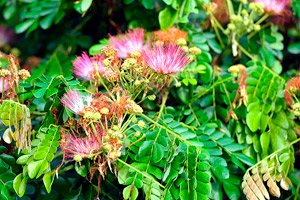
All iLive content is medically reviewed or fact checked to ensure as much factual accuracy as possible.
We have strict sourcing guidelines and only link to reputable media sites, academic research institutions and, whenever possible, medically peer reviewed studies. Note that the numbers in parentheses ([1], [2], etc.) are clickable links to these studies.
If you feel that any of our content is inaccurate, out-of-date, or otherwise questionable, please select it and press Ctrl + Enter.
Albizzia julibrissin: Polysaccharide with anti-cancer activity on pancreatic cells discovered
Last reviewed: 27.07.2025
 ">
">Albizzia julibrissin (silk tree) is a common plant in China. Its dried trunk bark is traditionally used in oriental medicine to treat insomnia, edema, fatigue, helminthic infestations, and confusion. Phytochemical studies of Albizzia julibrissin bark have previously identified saponins, lignans, phenolic glycosides, triterpenes, flavonoids, and other compounds. These bioactive substances are known for their sedative, antitumor, and antidiarrheal properties. However, data on the polysaccharides of this plant are still very limited.
In a recent study published in Glycoscience & Therapy, a team of Chinese scientists isolated a new polysaccharide fractionate, AJDW, from Albizzia julibrissin (AJD). It consists of glucose, galactose, xylose, and arabinose in a molar ratio of 7.36:9.03:7.06:2.24:1.
“To the best of our knowledge, this is the first report of a polysaccharide isolated from AJD,” said study co-author Fei He.
“We demonstrated that AJDW was able to suppress the growth and proliferation of pancreatic cancer cells both in vitro and in vivo. Notably, this polysaccharide inhibited tumor cell migration, blocked the cell cycle, and induced ROS-mediated apoptosis by reducing mitochondrial membrane potential through the PI3K/Akt/mTOR pathway.”
Pancreatic cancer is an extremely aggressive tumor with a poor prognosis, and most modern chemotherapeutic drugs are addictive or have serious side effects. Polysaccharides are increasingly considered as promising antitumor agents with better tolerability.
“In our study, we used a mouse model with transplanted tumors from patients, and AJDW completely stopped the growth of pancreatic cancer in immunodeficient mice, which was consistent with the results at the cellular level,” added co-author She.
“Our results not only identified a new polysaccharide in the Chinese herbal medicine AJD, but also demonstrated its anticancer effect.”
This discovery provides a basis for further study of the antitumor properties of AJD and the development of new drugs for the treatment of pancreatic cancer based on natural components.
